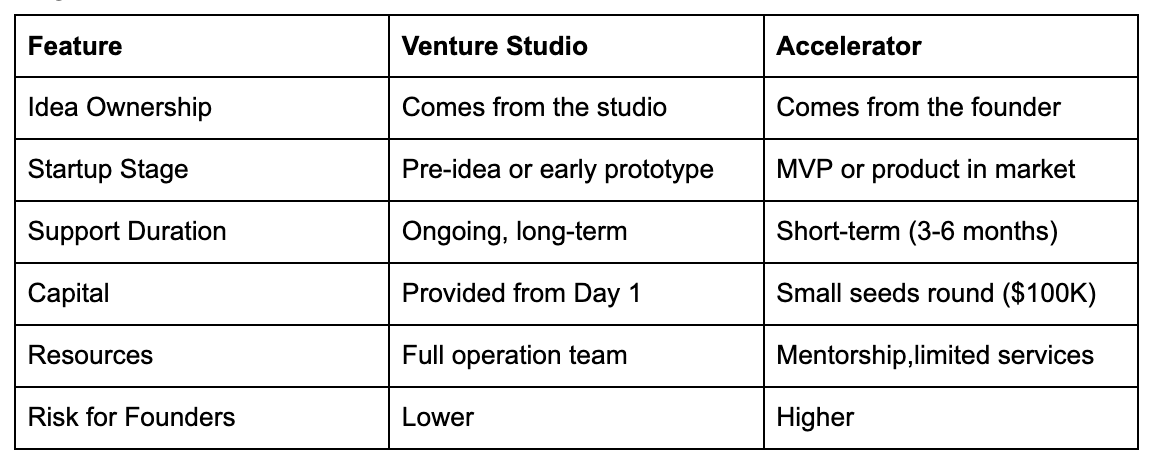In the fast-evolving startup ecosystem, founders face a fundamental question: Should I launch my startup through a venture studio or an accelerator? Both models offer unique advantages, but they cater to different founder profiles and startup stages.
This article explores the key differences between venture studios and accelerators, and which model ultimately delivers better outcomes for founders.
What Is a Venture Studio?
also known as a startup studio, company builder, or venture builder, is an organization that ideates, builds, and launches startups internally. Unlike accelerators that assist external startups, venture studios create their own concepts in-house, test them for market fit, and then recruit co-founders or CEOs to lead these ventures.
Key characteristics of venture studios include:
Idea Generation: Studios develop startup ideas internally, based on market gaps, trends, and research.
Validation: These ideas are tested and refined before any company is formally created.
Founder Recruitment: Once the idea is validated, the studio brings on founders to execute and scale the startup.
Infrastructure and Capital: The venture studio provides initial funding, legal support, design, product, HR, and technology resources, removing much of the early operational burden from founders.
This model allows founders to focus purely on execution with much less risk. Instead of starting from zero, they’re stepping into a machine that’s already moving, with a pre-validated idea, seed capital, and expert support.
What Is an Accelerator?
A startup accelerator supports early-stage companies through fixed-term programs that typically last between three and six months. Unlike venture studios, accelerators work with startups that already exist and have a founding team in place.
Features of accelerators include:
Founders Apply With Their Own Idea or MVP: Startups need to be at the idea or product stage to be considered.
Mentorship and Training: Accelerators offer guidance through workshops, networking, and mentor matching.
Seed Funding: Participating startups receive small amounts of funding (e.g., $100K–$150K) in exchange for equity.
Demo Day and Investor Access: At the end of the program, startups pitch to investors for future funding rounds.
Well-known examples include Y Combinator, Techstars, and 500 Startups. These programs often boost visibility and credibility, opening doors to venture capital and strategic partnerships.
Key Differences
Which Drives Better Founder Outcomes?
For First-Time Founders: Venture Studios
Venture studios de-risk entrepreneurship. Founders join validated projects with funding, a support team, and a clear go-to-market strategy. This is ideal for:
Domain experts (e.g., engineers, marketers) new to startups
Entrepreneurs who want operational backing
Those who prefer execution over ideation
Example: Antler and eFounders in Europe have helped dozens of first-time founders build multi-million-dollar SaaS and fintech companies with minimal prior startup experience.
For Experienced Founders: Accelerators
Accelerators work best for founders who:
Already have a clear idea or MVP
Seek exposure, mentorship, and network effects
Can leverage the accelerator’s brand to raise funding
Accelerators can supercharge momentum and lead to large seed or Series A rounds, especially in hot sectors like AI and fintech.
Example:Flutterwave (a leading African fintech unicorn) emerged from the Y Combinator accelerator and rapidly scaled after launch.
A Hybrid Approach?
Some founders even benefit from a hybrid approach: building with a studio, then joining an accelerator to scale and raise capital. As startup ecosystems mature, the lines between the two models are beginning to blur.
Final Thoughts
Both venture studios and accelerators have their place in the startup journey. The key is knowing your stage, strengths, and support needs.
If you need structure, capital, and deep operational support, studios are the way to go.
If you already have traction and seek funding and connections, accelerators will help you scale faster.
The best model for founders depends on their experience, the idea stage, and the kind of startup they want to build.


